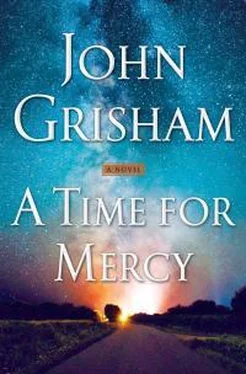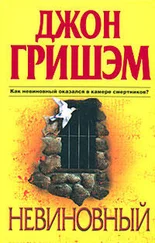Earl Kofer’s only request to the preacher was to “keep it short.” And Wyfong complied with a fifteen-minute sermon that was remarkably short on emotion and long on comfort. He finished with another prayer, then nodded at the singer for a final song. It was a secular number about a lonesome cowboy and it worked. Women were bawling again and it was time to go. The pallbearers took their positions around the casket and “You’ll Never Walk Alone” began to play softly over the speakers. The family followed the casket down the aisle, with Earl holding Janet steady as she wept. The procession moved slowly as someone turned up the volume.
Outside, two lines of uniformed men led to the hearse with its rear door open and waiting. The pallbearers lifted the casket and carefully placed it inside. Megargel and his men directed the family to the waiting sedans. A parade formed behind them, and when everyone was in place, the hearse inched away, followed by the family, followed by rows of officers on foot, with the Ford County contingent leading. Any and all friends, relatives, and strangers who wanted to make the trek to the cemetery fell in behind. The procession moved slowly away from the armory and down Wilson Street where barricades were in place and children stood silently by them. Townsfolk gathered on sidewalks and watched from porches and paid their respects to the fallen hero.
—
JAKE HATED FUNERALS and avoided them whenever possible. He viewed them as a serious waste of time, money, and, especially, emotion. Nothing was gained by having a funeral, only the satisfaction of showing up and being seen by the grieving family. And what was the benefit of that? After being shot at during the Hailey trial, he’d prepared himself a new will and left written instructions to be cremated as soon as possible and buried in his hometown of Karaway with only his family present. This was a radical idea for Ford County and Carla didn’t like it. She rather enjoyed the social aspects of a good funeral.
Saturday afternoon he left his office, drove across town, and parked behind a city rec center. He walked along a nature path, climbed a small hill, and veered down a gravel trail to a clearing where he sat at a picnic table with a view of the cemetery. Hidden among the trees, he watched the hearse stop in a sea of aging tombstones. The crowd worked its way to a bright purple burial tent with Megargel’s logo embroidered in bold yellow. The pallbearers labored with the casket for at least a hundred feet, and were followed by the family.
Jake was reminded of a well-known story of a lawyer down in Jackson who stole some clients’ money, faked his own death, and watched his own funeral while sitting in a tree. After he was caught and hauled back to Jackson, he refused to speak to friends who did not attend his funeral and burial.
How angry was the mob down there? At the moment, the prevailing emotion was one of great sorrow, but would that quickly yield to resentment?
Harry Rex, who apparently had decided to skip the burial, was convinced that Jake had thoroughly screwed up their chances with Smallwood. Jake had just become the most despised lawyer in the county, and the railroad and its insurance company would probably pull back from any settlement negotiations. And what about selecting a jury now? Any pool of prospective jurors would surely have people who knew of his representation of Drew Gamble.
He was too far away to hear the words or music at the burial. After a few minutes, he left and walked back to his car.
—
LATE IN THE afternoon, family and friends gathered at the large metal building that housed the Pine Grove Volunteer Fire Company. No proper send-off was complete without a heavy meal, and the ladies of the community brought in platters of fried chicken, bowls of potato salad and slaw, trays of sandwiches and corn on the cob, casseroles of all varieties, and cakes and pies. The Kofer family stood at one end of the room in a receiving line and suffered through lengthy condolences from their friends. Pastor Wyfong was thanked and congratulated on such a fine service, and the young nephew received kind words about his poem. The cowboy brought his guitar and sang a few songs as the crowd filled their plates and dined at folding tables and chairs.
Earl stepped outside for a smoke and gathered with some friends near a fire truck. One man pulled out a pint of whiskey and passed it around. Half declined, half took a swig. Earl and Cecil passed.
A cousin said, “That sumbitch can’t claim to be crazy, can he?”
“Already done it,” Earl said. “They took him to Whitfield yesterday. Ozzie drove him down.”
“He had to, didn’t he?”
“I don’t trust him.”
“Ozzie’s on our side this time.”
“Somebody said the judge ordered the boy taken away.”
“He did,” Earl said. “I saw the court order.”
“Damned lawyers and judges.”
“It ain’t right, I’m tellin’ you.”
“A lawyer told me they’ll keep him locked up till he’s eighteen, then turn him loose.”
“Turn him loose then. We can take care of him.”
“You can’t trust Brigance.”
“Will they even put him on trial?”
“Not if he’s crazy. That’s what the lawyer said.”
“The system sucks, you know. It ain’t right.”
“Can anybody talk to Brigance?”
“Of course not. He’ll fight like hell for the boy.”
“That’s what lawyers do. The system is designed to protect the criminal these days.”
“Brigance will get him off on one of those technicalities you hear about.”
“If I saw that sonofabitch on the street I’d kick his ass.”
“All I want is justice,” Earl said. “And we ain’t gonna get it. Brigance will plead insanity and the boy will walk, just like Carl Lee Hailey.”
“It ain’t right, I’m tellin’ you. It just ain’t right.”
15
Lowell Dyer was hearing the noise from down the road in Ford County. He took three calls at home Sunday afternoon, all from strangers who claimed they voted for him, and listened to their complaints about what was happening in the Gamble case. After the third, he unplugged his phone. The one at the office had a number that was advertised in every directory in the Twenty-second District, and evidently it rang all weekend. When his secretary reached for it early Monday morning she saw that there were over twenty calls and the mailbox was full. On an average weekend there were half a dozen. Zero was not unusual.
Over coffee, she and Lowell and the assistant D.A., D. R. Musgrove, listened to the messages. Some of the callers gave their names and addresses, others were more timid and seemed to think they were doing something wrong by calling the district attorney. A few hotheads used profanity, did not give their names, and implied that if the judicial system continued to go haywire they just might have to fix it themselves.
But it was unanimous—the kid was out of jail and pretending to be crazy and his damned lawyer was once again pulling a fast one. Please, Mr. Dyer, do something! Do your job!
Lowell had never had a case that attracted so much interest, and he swung into action. He called Judge Noose, who was at home “reading briefs” as he always claimed to be doing when he wasn’t in court, and they agreed it was a good idea to call a special meeting of the grand jury to deal with the case. As the district attorney, Lowell controlled every aspect of “his” grand jury and needed no one’s approval to call it into session. But given the sensational nature of the Gamble case, he wanted to keep the presiding judge apprised. During their brief conversation Noose said something about a “long weekend” around his house, and Lowell suspected his phone had been ringing too.
Читать дальше












![Джон Гришэм - Апелляция [Фейк]](/books/403002/dzhon-grishem-apellyaciya-fejk-thumb.webp)